 Petzlover
Petzlover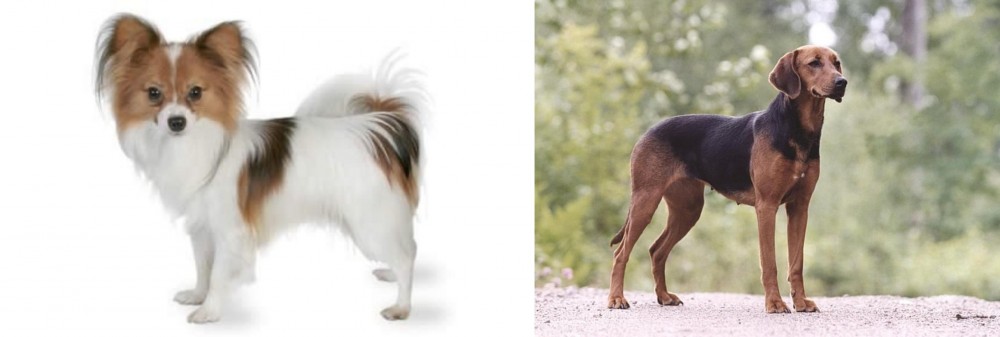 Papillon is originated from France but Schillerstovare is originated from Sweden. Papillon may grow 33 cm / 12 inches shorter than Schillerstovare. Papillon may weigh 20 kg / 44 pounds lesser than Schillerstovare. Both Papillon and Schillerstovare has same life span. Papillon may have less litter size than Schillerstovare. Papillon requires Moderate Maintenance. But Schillerstovare requires Low Maintenance
Papillon is originated from France but Schillerstovare is originated from Sweden. Papillon may grow 33 cm / 12 inches shorter than Schillerstovare. Papillon may weigh 20 kg / 44 pounds lesser than Schillerstovare. Both Papillon and Schillerstovare has same life span. Papillon may have less litter size than Schillerstovare. Papillon requires Moderate Maintenance. But Schillerstovare requires Low Maintenance
 With his eye-catching butterfly-look-alike feathery ears, the Papillon, also called the Continental Toy Spaniel or the Squirrel Spaniel, is one of the oldest of the toy spaniels.
With his eye-catching butterfly-look-alike feathery ears, the Papillon, also called the Continental Toy Spaniel or the Squirrel Spaniel, is one of the oldest of the toy spaniels.
You can see that the history of the Papillon goes very far back as the dog has been depicted in early works of art dating back to the 1500s. They were at first bred for the companions of noblewomen, appearing in many paintings where they are seen in royal courts.
The AKC registered its first Papillon in 1915. It is believed that the dog hails from France and Belguim. The Papillon was first recognized by the AKC in 1935 and the Papillon Club of America was also formed.
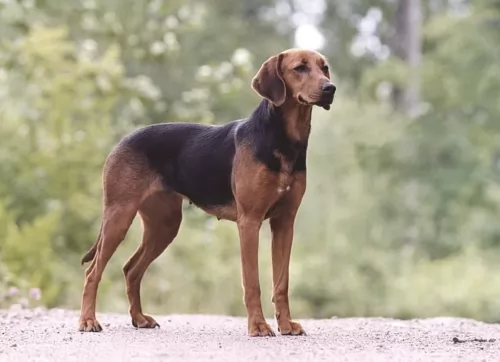 The Schillerstövare originated in Sweden, being named after a Swedish farmer, Per Schiller. After he died, the dog was named Schillerstövare in 1907, and was Sweden's first native dog breed.
The Schillerstövare originated in Sweden, being named after a Swedish farmer, Per Schiller. After he died, the dog was named Schillerstövare in 1907, and was Sweden's first native dog breed.
The Swedish Kennel Club recognised this dog in 1907 and it is also recognised by the Federation Cynologique Internationale as well as a number of minor kennels and dog clubs.
The dog has always been used as a hunting dog and the English Foxhound is the e foundation for this breed.
 Papillon means 'butterfly' which refers to the dog's fringed upright ears. You also get the floppy eared variety which is known as phalene, meaning 'moth'.
Papillon means 'butterfly' which refers to the dog's fringed upright ears. You also get the floppy eared variety which is known as phalene, meaning 'moth'.
The Papillon dog stands at between 20 – 28cm in height and weighs between 3 and 4.5kg. The tail arches over the back in a feathery plume. His coat is thick and silky but he doesn't have an undercoat. The coat is white with tan or white with black.
When you look at his bright little face, you can see that he is an intelligent dog who can be trained and socialized with ease. In fact he loves to be occupied with something challenging, so it will be a good ides to buy him some stimulating toys to play with.
When you first see the Papillon dog you might think he is fragile like a butterfly – a typical lap dog – but this isn't so at all. He is tough, robust, energetic, alert and friendly. Bright and alert, they also make great watchdogs.
He'll be able to adapt to life in the city or the countryside. Even though he is good with children and pets in the home, he'd prefer to live with adults as he couldn't handle undisciplined rough and tumble children who haven't learned how to respect dogs, especially little ones that can get hurt easily.
This is such a sweet-natured little dog that you want to do everything you can to keep him content
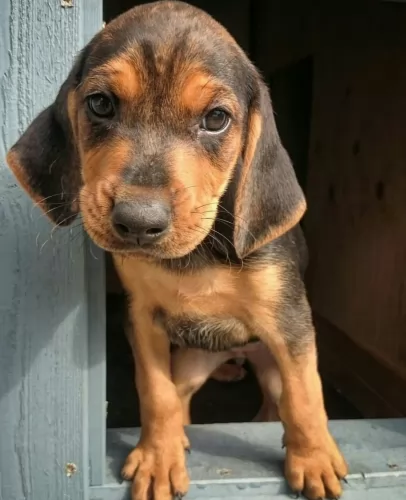 The Schillerstövare is a medium to large sized dog. They’re athletic and muscular.
The Schillerstövare is a medium to large sized dog. They’re athletic and muscular.
Standing at between 53–61cm in height and weighing in the region of 18–25kg, the coat of the dog is fairly short and harsh, with the color being black and tan.Sometimes you’ll see some white markings on the chest and paws.
The head is domed, the eyes brown, bright and alert and the ears of the dog are broad, medium length and floppy. The long tail is carried low or held out when running or alert.
If you allow your Schillerstovare to have puppies, you can expect between 3 to 7.
The Schillerstovare is a calm dog but he can get petty lively when there’s a game to be had. He gets on well with well disciplined children who have been taught to be kind and respectful to animals. He also gets on well with pets in the home. Just like with most other dogs, he will need to be trained and socialized as he is a strong willed, confident, dominant dog.
He is friendly and active but will be somewhat reserved around strangers.These dogs will require a lot of exercise and will need quite a bit of space too. They aren't well suited to small properties in the city. He will need a daily walk but also a chance to get off his leash and run free in the park. Other forms of exercise such as hikes, ball game and swimming will delight him.
 The Papillon is a bright, intelligent and energetic little dog. When you bring him into your home you must remember that small though he is, he will require lots of mental and physical exercise.
The Papillon is a bright, intelligent and energetic little dog. When you bring him into your home you must remember that small though he is, he will require lots of mental and physical exercise.
You're going to love having the Papillon in your home as he is guaranteed to make the sweetest, most loving pet and companion.
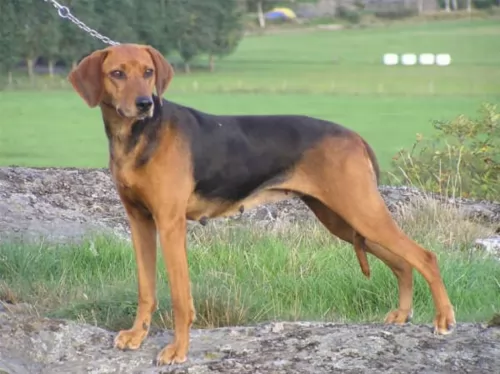 Schillerstovares are social, loving, friendly, loyal dogs who enjoy being around their human family. He’s going to need a lot of exercise, both mental and physical to keep him from boredom and frustration.
Schillerstovares are social, loving, friendly, loyal dogs who enjoy being around their human family. He’s going to need a lot of exercise, both mental and physical to keep him from boredom and frustration.
He will rely on you for at least a daily walk. He is strong-will and confident and will do well in a family where they are active and where they are firm, patient, kind and consistent in their behaviour towards him because then he ticks all th right boxes for being a splendid pet.
 As a responsible dog owner you want to make sure that your pet has the best chance to reach the age of 14, 15 or 16. Unfortunately, there are always some common dog illnesses that you need to be aware of -
As a responsible dog owner you want to make sure that your pet has the best chance to reach the age of 14, 15 or 16. Unfortunately, there are always some common dog illnesses that you need to be aware of -
This condition occurs when the dog's patella or kneecap is dislocated and then it can only be returned to its normal position once the quadriceps in the hind legs of the dog relax and lengthen. You’ll see dogs with this condition holding up a hind leg. This joint abnormality is more common in toy breeds like this.
The windpipe of a dog is made out of tissue membranes and when the dog breathes, air quickly moves through the trachea, causing the pressure inside of it to go down. A weak cartilage in the windpipe causes a collapsed trachea in dogs, and occurs almost exclusively in small dogs such as the Papillon.
Many small dogs are born with cartilage that is strong enough to hold the trachea open. As cartilage ages though, it weakens. You’ll notice your dog has a rasping cough when he is excited. Sometimes it is mistaken for kennel cough which can be remedied fairly quickly while a collapsed trachea in dogs is a lifelong syndrome.
 Even though your Schillerstovare is a healthy dog breed, hip dysplasia is a common dog disease that many dogs get.
Even though your Schillerstovare is a healthy dog breed, hip dysplasia is a common dog disease that many dogs get.
This is a skeletal disease when a dog’s hip joints become partially dislocated. It can be very difficult for your dog to get around, and he can also develop arthritis. It gets very sad when your dog doesn’t even want to participate in games anymore.
 Papillons are average shedders so they will require brushing at least twice a week. Certainly the long ear fringes will need to be washed and brushed, after all this is this little dog’s trademark.
Papillons are average shedders so they will require brushing at least twice a week. Certainly the long ear fringes will need to be washed and brushed, after all this is this little dog’s trademark.
You’ve got to be careful with a small dog like the Papillon as it can easily become overweight and that in itself can bring on health problems. There are excellent commercially manufactured dog foods for small breed dogs that have the right amount of minerals and vitamins in them. Choose the best quality ones.
Home-made food such as chopped-up boiled chicken, some brown rice or pasta and cooked vegetables such as carrots, spinach and sweet potatoes can keep your little dog healthy and fit. Dogs just want simple, nutritious meals which aren’t changed often as it could upset their digestive system.
Keep things consistent and avoid human foods such as chips, chocolates, coffee and spices Never leave your pet without a steady supply of fresh, cool water.
Provide your pet with a nice warm, dry bed.
If you bring a puppy into the home, check on puppy vaccines to avoid some deadly diseases.
Get your dog neutered or spayed if you don’t want it to become a parent.
Exercise your pet and provide him with love and attention.
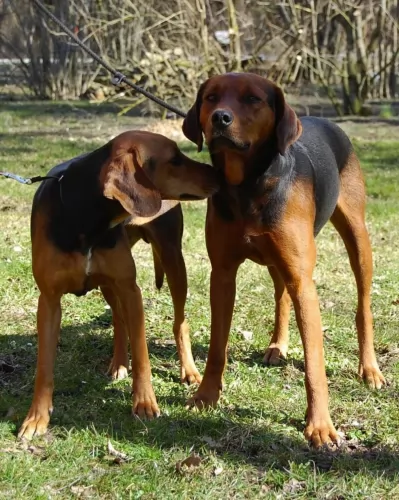 With his short coat, the Schillerstovare is considered a low maintenance dog and requires a minimal amount of grooming. Brushing should be done twice a week to remove loose hair. The harsh outer coat seems to repel dirt and dust.
With his short coat, the Schillerstovare is considered a low maintenance dog and requires a minimal amount of grooming. Brushing should be done twice a week to remove loose hair. The harsh outer coat seems to repel dirt and dust.
Trim your pet’s nails, check inside his ears for signs of redness, make sure his eyes are bright and clear and make sure he doesn’t have any unusual lumps on him.
Make sure his vaccines are up to date to avoid deadly canine diseases. Take him to the vet when you suspect he isn’t his normal self.
Dogs, just like humans, do well on good, nutritious diets. Feed a human lots of junk food and sweets and they’ll grow up to be obese and unhealthy. That's exactly how it is with dogs too. Some of the best commercially manufactured dog foods are convenient and they can be good if you look at the top brands. Look for ones that cater for your dog’s age, size, breed and activity levels. This dry kibble can be made more inviting for your pet when you include some homemade food.
Dogs just want simplicity so that they don’t battle with digestive problems. Boiled chicken, sweet potatoes, brown rice or pasta, carrots and spinach will be wonderful for him when you chop the food up and add it into the dry kibble twice a week. See his tail wag and his brown eyes light up when he smells this treat. Some raw meat added up occasionally will also contribute to your pet’s heath.
Make sure he is never without a constant supply of fresh, cool water.